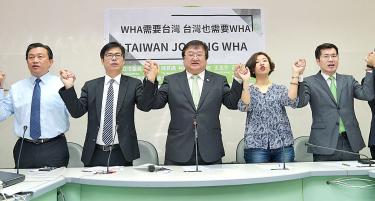Lawmakers and doctors yesterday accused China of maneuvering to exclude Taiwan from this year’s World Health Assembly (WHA) and said that Taiwan should seek participation without any political preconditions.
The WHA, the decisionmaking body of the WHO, is scheduled to hold its annual meeting in Geneva, Switzerland, from May 22 to May 31. The WHO secretariat has not yet issued an invitation to Taiwan.
The Democratic Progressive Party (DPP) caucus and the Taiwan Medical Association (TMA) yesterday urged the WHO to issue the invitation by the registration deadline on Monday next week.
“The exclusion of Taiwan from the WHA is political and health apartheid, an act of injustice by Beijing,” DPP Legislator Lo Chih-cheng (羅致政) said.
“The founding philosophy of the WHA is health for all, but the reality is health for all except for Taiwanese,” Lo said.
President Tsai Ing-wen (蔡英文) said in an interview last week that the WHA meeting would be an important indicator of relations between Taiwan and China, and Beijing should understand the implication of Taiwan’s absence from the WHA on cross-strait relations, Lo said.
“Many WHA members support Taiwan’s participation and Beijing’s intervention has destabilized international peace,” Lo said.
The SARS epidemic in 2003 is proof that diseases are not bound by borders and Taiwan’s exclusion from the WHA would create a loophole in the global disease prevention network, he added.
DPP Legislator Wang Ding-yu (王定宇) slammed the Chinese Nationalist Party (KMT) for asking the government to accept the so-called “1992 consensus” to ensure WHA invitation.
The “1992 consensus” refers to a tacit understanding between the KMT and the Chinese government that both sides of the Taiwan Strait acknowledge there is “one China,” with each side having its own interpretation of what that means.
“The acceptance of the 1992 consensus and its ‘one China’ framework would make Taiwan a part of Beijing’s delegation. Is the KMT speaking for China or Taiwan?” Wang said.
There should be no preconditions for WHA membership, and using membership as political leverage runs counter to the principles on which the WHO is founded, Lo said.
Taiwan is an important contributor to global immunization and disaster relief, and the nation’s health insurance system ensures quality and affordable healthcare to all citizens, which has been closely studied by governments and international medical bodies, DPP Legislator and TMA president Chiu Tai-yuan (邱泰源) said.
Taiwan is ranked first in Asia and sixth in the world in terms of palliative care, and this global leader in healthcare and medicine should not be excluded from the WHA for political reasons, Chiu said.
China has also attempted to pressure the World Medical Association (WMA) to rename the TMA the “Taiwan China Medical Association,” TMA secretary-general Wang Bi-sheng (王必勝) said.
The Chinese association issued a written request during the WMA general assembly in Zambia last month for the name change, but the request was rejected because WMA members understood that the TMA is a non-political body and the issue should not be treated politically, Wang said.
“China had made informal proposals to change the name of the TMA, but it was the first time it issued a written request. It is expected that China will make another formal request at the general assembly in October,” Wang said.
Chiu and DPP Legislator Lin Ching-yi (林靜儀) said they would seek to participate in the WHA as members of non-governmental organizations.
Source: Taipei Times - 2017/05/03





















